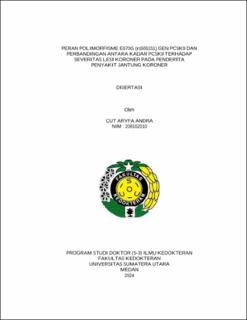Peran Polimorfisme E670G (rs505151) Gen PCSK9 dan Perbandingan antara Kadar PCSK9 terhadap Severitas Lesi Koroner pada Penderita Penyakit Jantung Koroner
The Role of E670G (rs505151) Polymorphism in The PCSK9 Gene and Comparison of PCSK9 Levels and The Severity of Coronary Lesions in Coronary Artery Disease

Date
2024Author
Andra, Cut Aryfa
Advisor(s)
Rambe, Aldy Safruddin
Hasan, Refli
Sembiring, Rosita Juwita
Metadata
Show full item recordAbstract
Background: Cardiovascular disease, the most prevalent health issue globally, continues to escalate in both developed and developing nations. A notable method for assessing the risk of coronary artery disease (CAD) involves evaluating PCSK9 polymorphism. The regulation of cholesterol levels can be impacted by mutations in the PCSK9 gene, and research has looked into the connection between PCSK9 polymorphisms and cardiovascular risk factors. Remarkably, little study has been done particularly examining the E670G polymorphism in the PCSK9 gene among Indonesian patients with stable CAD. Thus, the primary goal of this study was to determine if the E670G polymorphism and the severity of coronary lesions in patients with stable CAD are correlated.
Methods: This study used an analytical case-control methodology to evaluated the E670G polymorphism PCSK9 gene and plasma PCSK9 levels in both the control group (SYNTAX score < 22) and the case group (SYNTAX score > 22), Patients with stable CAD who had completed coronary angiography examinations were the study's main focus. Using the Restriction Fragment Length Polymorphism (RFLP) approach, the PCSK9 gene's E670G polymorphism was evaluated. Plasma PCSK9 levels were obtained from peripheral venous blood and processed using ELISA method. The chi-squared test and the ROC curve was used to analyze data. Multivariate analysis was conducted to assess all risk factors. Regression analysis was used to establish a predictor model for the severity of coronary lesions in patients with CAD.
Results: The PCR electrophoresis results of isolated DNA from the PCSK9 gene (rs505151) indicated DNA bands corresponding to the genotypic variants AA (287 bp), AG (287 bp, 215 bp), and GG (215 bp, 72 bp). Based on the research findings, a p-value of 0.611 was obtained, suggesting that there was no significant difference in the polymorphic status of the E670G (rs505151) between the case and control groups. PCSK9 levels in the case group were significantly higher than those in the control group (p <0.001). Utilizing the ROC curve, the diagnostic cutoff point was determined to be 70.35, with a sensitivity of 75% and specificity of 78%. Multivariate analysis indicated that hypertension, dyslipidemia, family history, diabetes mellitus (DM), obesity, and smoking could influence the severity of coronary lesions in patients with CAD. The predictor model without lipid profile for CAD risk factors was described as follows : Y = -3.941 + (2.134) hypertension + (2.134) dyslipidemia + (1.731) obesity + (1.147) family history + (2.025) diabetes mellitus (DM) + (1.606) smoking + (2.953) PCSK9. The predictor model with CAD risk factors and lipid profile was described as follows Y = 2.553 + (-2.53) hypertension + 1.715 total cholesterol + (-3.096) HDL + (-1.338) family history + (- 1.907) diabetes mellitus (DM) + (-1.907) smoking + 2.419 (PCSK9)
Conclusion: PCSK9 gene polymorphism was not associated with the severity of coronary lesions but PCSK9 levels were significantly associated with the severity of coronary lesions and lipid profile.
Collections
- Doctoral Dissertations [194]
